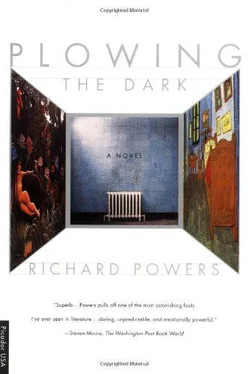It struck Spiegel, in that moment, that he would never have a life mate. Never a real one, for any length of time.
By spring, Mahler Haus lay sacked and ruined. The winds of possibility blew utopia apart. The Madison bombing had spelled the end of world revolution. The Mahler Haus experiment in group living spelled, for each of them, the end of idealism. Each creator retreated to his private bedroom, and the Grand Ballroom closed its doors on group communion for good.
"Things fall apart," Ted told him. "The center cannot hold." But the man seemed untouched by the centripetal wipeout.
In Spiegel's memory, his parents' divorce the following year seemed a minor rehash by comparison. Now almost twice the boy poet's age, Spiegel couldn't recall the particulars of the smashup with any resolution. He felt only the shame of failed reciprocity, of free flights crashing
back to ground level.
Things got recriminatory, fast. All soirees ground to a stop. Potter David's beautiful celadon dishes disappeared from the kitchen. The housemates liquidated the group bank account and settled all remaining bills through bitter back-and-forth. Ugly altercations ensued, about who'd lost the key to the cellar. About who forgot to shut off the oven. About who left the hair in the sink. Even when he knew it was his damn hair, Spiegel denied it.
Ted took the easy way out. Doors all over Madison opened up for him, the apartments of women who needed a new fix of Dives and Lazarus. "You son of a bitch," Spiegel laid into him, the night Ted came back to the house to move his belongings out. "You're going to abandon me in the ninth circle of hell, while you head off to fresh pastures."
"Think of it as an adventure." Ted smirked. "Besides. You're not alone."
"Who do you mean? Adie? What good is she? She's camped out over at her studio in the Education Building."
"You think I don't know that? She's not who I mean." "Who, then? I'm left here to pick up the pieces. It makes me sick to my stomach, even to think about working. What the hell am I supposed to do?"
With a single, smooth motion, Zimmerman went to the shelves of the pillaged group library and found the red-spined paperback Collected Yeats that no one now wanted. He took down the book, slowly read, then scribbled something on the flyleaf. He chucked the volume at Spiegel, who caught it in mid-arc, as if they'd practiced the slant pattern for months. Zimmerman embraced his friend with the casual backslapping of joyous athletes. And left.
From his second-story window, Spiegel watched the figure jaunt down the leaf-exploding street. Only then did he open the ratty paperback and read the inscription:
We have fed the heart on fantasies,
The heart's grown brutal from the fare;
More Substance in our enmities
Than in our love; Î honey-bees,
Come build in the empty house of the stare.
The words came back now to fill this new emptied house, art's latest restored ruin. Adie squatted in front of the colored slab that would become the virtual Dutchman's bed. She held her hands out in front of her, in space, resting them on the pretend surface that would soon become blankets. Then she rested her head on those folded hands. What's that cliché? The one attributed to every famous sculptor who ever lived? We just have to free the bed hidden in this block. Chip away everything that isn't it.
They did, throughout that September and October. They chipped away, until the blocks became objects. Spiegel helped her with the caning on the chairs, the glaze of the water pitcher, the soft red nub of the bedspread. This time, the game did not stop with surfaces. Each furnishing graduated from flat illusion into volume and shading. More was at stake this time than mere similarity.
The bed stood out from the wall. It occupied its quarter of the room, so palpable that even Freese, on his first visit, gave in to the reflex impulse to smooth its covers. The room filled in. It materialized, up through the oils of half-finished underpainting, the penned cartoon here and there still showing through. On the Cavern's universal walls, they hung Arlesean wallpaper. One by one, the geometrical placeholders took on shape. And week by week, Jackdaw, the unlikeliest of Geppettos, labored away at the code that threatened to bring these woody constructs to life — to a life that life would accredit.
Spiegel carved, too, at the larger block of wood lodged inside the smaller puppet casing. And every image he embellished cracked open to reveal its batting.
After Mahler Haus self-destructed, Stevie had pressed on to get the worthless English degree, throwing good money after bad, unable to change courses or salvage the disaster. Of the whole circle of former idealists, the only ones he ever saw again were the two who had tricked him into utopia. The same couple who'd driven him out again.
Spiegel called Adie the month before she graduated. He roped her into a lunch date, where she ate nothing and smiled her way around all substantive shoals. Steve asked her for a copy of the sketch she'd made of him, that night they'd spoken of Ted. "That? I've destroyed it."
The words hit Spiegel with a force out of all proportion to the loss. He stood looking down into the hole that awaited all creative effort. "Destroyed? What do you mean, destroyed?" "Crumpled up. Thrown away. Most of what I draw I end up pitching."
"You can't be serious. Why?" "Because most of it makes me ill."
"God… damn it." The rage returned to him, the rage he'd felt when they torched their dream of shared existence. "Why the hell bother to draw it in the first place?"
"Good question." She thought for a long time. "I'd like to think that every mark gets stored. Somewhere."
He and Zimmerman continued to meet for occasional handball and Stravinsky. Ted still gave Spiegel his monthly homework assignment, readings to prepare and deliver. The soirees shrank to the two of them sitting in the corner of Gino's Pizzeria on State, the one where the New Year's Bomber had once worked. They'd hover over a large mushroom and pepper, struggling with scansion or polychords.
One night Ted visited the hole in the wall on East Mifflin that Steve had moved into. He brought a 1958 Georges de Latour Private Reserve Napa Cabernet — a monster wine well beyond undergraduate means— and decent red wineglasses as well. Ted chatted even more maniacally than usual. But he would not say what the celebration was until they opened the bottle and imbibed.
They talked modernism, the rind of archaism that had settled so rapidly on that radical aesthetic. "Have I made you read Joyce's Portrait yet?" Ted joked.
Spiegel sighed over the rim of his goblet. "Twice." "Can I tell you something?" Zimmerman said, a slight change in cadence. "I seem to have MS. Just found out this afternoon."
It took Spiegel too long to decode, to figure out what the man had just announced. By the time he did, the moment for real comfort was lost.
In his memory of the event, Spiegel said nothing. Utterly, stupidly nothing. Nothing of use or condolence or aid, for the rest of the night. Ted, at least in memory, left shortly after dropping his bomb, still vaguely buzzing. "Oh. Hey. I've also finished my octet."
The topic sprung Spiegel from the spell that had fallen over him. "Really? That's fantastic. When do we get to hear it?"
"You tell me. As soon as I find eight players who'll sit still long enough to learn something that jagged."
That was his piece. That was the man's piece. Never performed, so far as Spiegel ever heard.
Chance threw them all clear of the wreck. Adie made her way to New York, the Butter-and-Eggs district, where she worked in the MoMA cafeteria and painted. Ted made his way out the year after, up to Washington Heights, where he waited on tables on a restaurant boat moored in the Hudson and studied graduate composition with Davidovsky, at Columbia. Spiegel graduated with a degree in English and four poems that he liked. He moved to San Francisco, as far from New York as he could get and still have crappy weather.
Читать дальше












